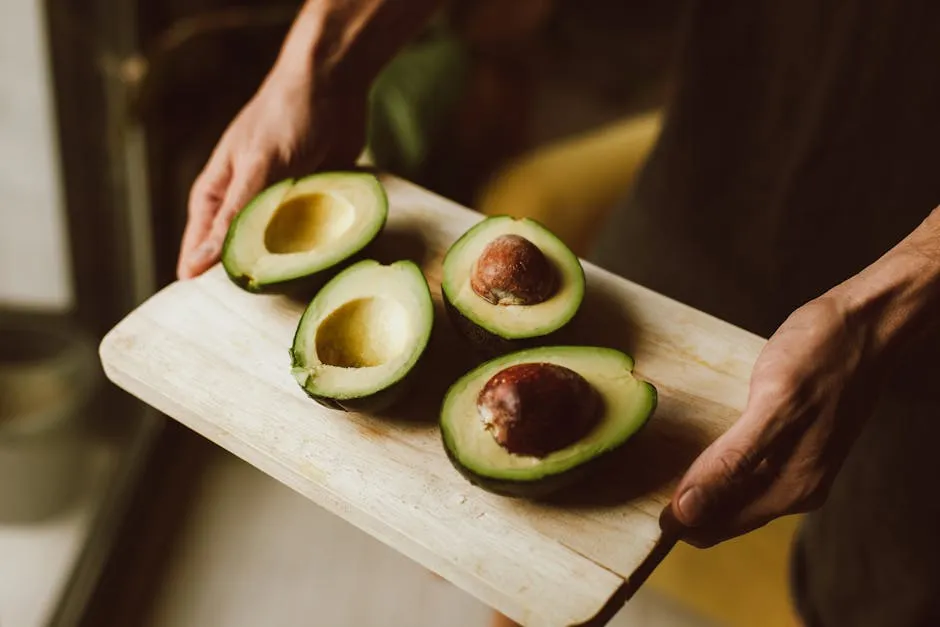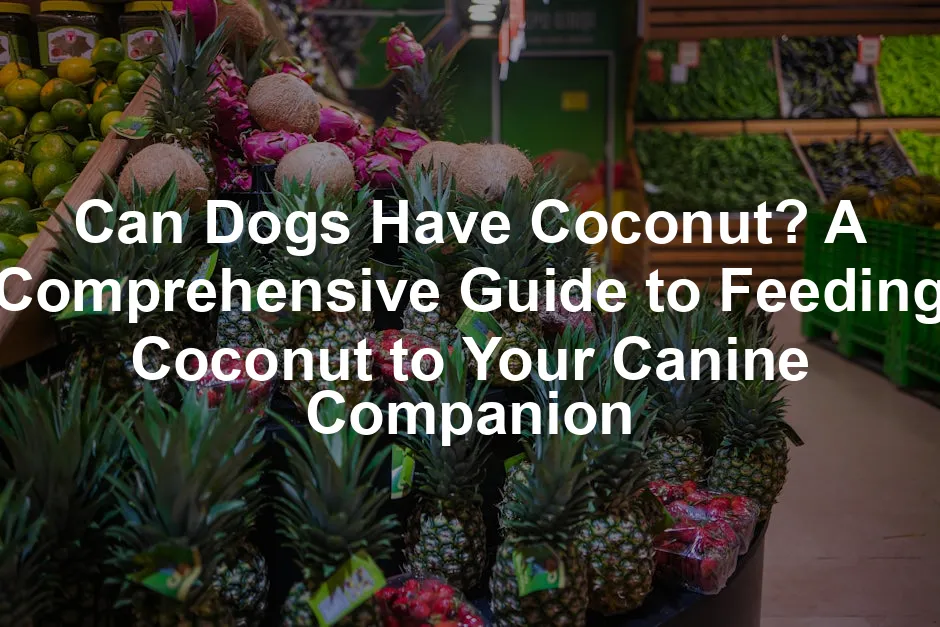Introduction
Coconut is a popular food for humans. Recently, it has made its way into dog diets too. But can dogs safely eat coconut? This guide examines the benefits and risks of coconut for your furry friend.
Summary and Overview
In this article, we’ll discuss whether dogs can consume coconut and how to do so safely. Coconut offers several nutritional benefits, including healthy fats, vitamins, and minerals. However, moderation is key. Always consult your veterinarian before introducing coconut into your dog’s diet. We’ll break down the different coconut products—flesh, oil, and milk—along with tips on safe feeding practices. Understanding these elements will help ensure your dog’s health and happiness while enjoying this tropical treat.

Speaking of tropical treats, have you tried making your own coconut snacks? You can whip up a batch of Coconut Snacks for your dog that are both tasty and healthy. Your pup will thank you for the deliciousness!
Can Dogs Eat Coconut?
Overview of Coconut for Dogs
Coconut is safe for dogs in moderation. It’s non-toxic and provides several health benefits. This tropical fruit is rich in fiber, healthy fats, and essential vitamins. The fiber helps with digestion, while the fats can boost energy levels. Coconuts also contain antioxidants, which can support your dog’s immune system.
However, coconut is high in calories and fat. Overindulgence can lead to weight gain or digestive issues. Dogs with pancreatitis or obesity should avoid it altogether. Always consult your veterinarian before adding coconut to your dog’s diet.

Coconut Products Safe for Dogs
Coconut Flesh
Coconut flesh is a tasty treat for dogs. It’s safe for them to consume, but moderation is key. A small piece or a few flakes can be offered based on your dog’s size. For small dogs, a pinch is enough, while larger dogs can enjoy a teaspoon.
Coconut flesh has several benefits. It provides healthy fats that can improve skin and coat condition. Plus, the antioxidants in coconut can help fight inflammation. Just remember to introduce it slowly and watch for any signs of digestive upset. If your dog enjoys the taste, it can be a delightful addition to their diet!

Coconut Oil
Coconut oil can be beneficial for dogs in various ways. Many pet owners use it topically to soothe dry skin or as a natural moisturizer. It’s also added to some dog foods for its potential health benefits. When including coconut oil in your dog’s diet, moderation is crucial. Start with a small amount, about a teaspoon for larger dogs and less for smaller breeds.
Excessive consumption may lead to digestive upset or weight gain. Some experts debate the actual benefits of coconut oil, suggesting it may not be essential for all dogs. Always check with your veterinarian before adding it to your dog’s routine, especially if your dog has health concerns. If you want to give your dog a boost, consider using Organic Coconut Oil for Cooking for both you and your furry friend!

Coconut Milk
Coconut milk can be safe for dogs when given in moderation. This creamy treat can be a delightful addition to your dog’s diet. However, it’s important to be cautious. Too much coconut milk may cause digestive issues like diarrhea. If you opt for store-bought coconut milk, always check for harmful additives, like sugar or preservatives.
Plain, unsweetened coconut milk is the best option. Limit it to just a teaspoon per meal to avoid upsetting your dog’s stomach. As always, consult your veterinarian before introducing new foods to your dog’s diet to ensure it’s a good fit for their health needs. You might even enjoy some Coconut Milk Ice Cream as a treat yourself!

Coconut Water
Dogs can safely drink coconut water, which is often praised for its hydrating properties. This natural beverage contains essential nutrients, like potassium and electrolytes. However, be cautious with the amount. High potassium levels can be risky for some dogs, especially those with kidney issues.
Offering a small amount occasionally is best to prevent potential health risks. Additionally, make sure the coconut water is pure and free from added sugars or preservatives. Remember, while coconut water can be refreshing, it should not replace your dog’s main source of hydration, fresh water. If you’re looking for a great way to keep your dog hydrated, consider a Dog Water Fountain that provides fresh water all day!

What Coconut Products Should Dogs Avoid?
Sweetened Coconut and Coconut Sugars
Sweetened coconut products are harmful to dogs. These items often contain added sugars that can lead to obesity and dental issues. Just like in humans, excessive sugar intake can cause diabetes in dogs. Additionally, sugar can upset their stomach and lead to gastrointestinal problems. Always opt for unsweetened varieties to keep your dog’s health intact.

Coconut Shells and Husks
Coconut shells and husks pose serious risks to dogs. These hard parts can splinter and cause choking. They might also lead to intestinal blockages if swallowed. This can result in severe health issues requiring emergency veterinary care. To keep your dog safe, always remove these hard components before offering coconut treats.

How to Feed Coconut to Your Dog
Guidelines for Introducing Coconut
Introducing coconut to your dog’s diet should be done carefully. Start with a small amount, like a pinch of coconut flesh. Observe your dog for any adverse reactions, such as upset stomach or diarrhea. If everything goes smoothly, you can gradually increase the serving size.
Always consult your veterinarian before adding coconut to your dog’s meals. They can offer tailored advice based on your dog’s health history. Remember, moderation is key. Treats, including coconut, shouldn’t exceed 10% of your dog’s daily caloric intake. This approach ensures your furry friend enjoys the benefits of coconut without any health risks.

Creative Ways to Feed Your Dog Coconut
Coconut can be a delightful treat for your furry friend. Here are some fun and creative ways to incorporate it into their diet.
1. Coconut Oil Pup-sicles: Blend half a cup of solid coconut oil with some of your dog’s favorite fruits. Pour this mixture into an ice cube tray and freeze. Serve one pup-sicle as a refreshing treat on warm days.
2. Coconut Peanut Butter Dog Biscuits: Preheat your oven to 375°F. Mix half a cup of coconut flour with one egg, half a cup of water, half a cup of peanut butter, and a tablespoon of honey. Roll out the dough, cut it into shapes, and bake for about 20 minutes. Your dog will love these tasty biscuits! And if you need a great Dog Treat Baking Kit to get started, they have some fantastic options!

3. Coconut Milk Smoothie: Blend one banana, half a cup of blueberries, and a tablespoon of coconut milk. This smoothie can be served as a special snack or a food topper. It’s nutritious and delicious!
These recipes not only provide tasty options but also add nutritional benefits to your dog’s diet. Remember to keep portions small and monitor your pup’s reaction to new foods.

Conclusion
In summary, coconut can be a safe and enjoyable treat for dogs when given in moderation. Always consult your veterinarian before introducing any new foods, including coconut, to your dog’s diet. Remember, moderation is key to avoiding digestive issues. With the right approach, you can let your dog savor the benefits of coconut while ensuring their health and happiness. Enjoy these delightful treats together!

FAQs
Can all dogs eat coconut?
Not all dogs can eat coconut. Check with your vet, especially if your dog has health issues or dietary restrictions.
What is the best form of coconut for dogs?
Coconut flesh and oil are generally safe. Avoid sweetened products and coconut shells.
Are there any side effects of feeding coconut to dogs?
Excess coconut can cause digestive upset or diarrhea. Monitor your dog for any adverse reactions.
How much coconut can I give my dog?
Start with small amounts. A teaspoon is suitable for larger dogs, while smaller breeds need less.
Can dogs eat coconut-flavored treats?
Be cautious with flavored treats. They may contain additives that could be harmful to your dog. Always choose natural options when possible.
Please let us know what you think about our content by leaving a comment down below!
Thank you for reading till here 🙂
All images from Pexels





